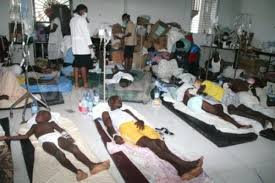Lagos is facing a severe cholera outbreak, with 24 deaths, 35 confirmed cases, and 417 suspected cases as of Friday, July 21, 2024.
The city is gripped by fear as this vicious intestinal illness spreads, particularly in areas lacking clean water and proper sanitation.
The outbreak spans all 20 Local Government Areas (LGAs) of Lagos, with the highest incidence in Ajeromi, Kosofe, Epe, Ikorodu, Alimosho, and Eti-Osa.
READ ALSO: UNICEF Calls For Urgent Measures To Protect School Children From Cholera Outbreak
The State Commissioner for Health, Prof. Akin Abayomi, emphasized the need for strict adherence to personal and environmental hygiene to combat the spread.
Globally, cholera is resurging. The World Health Organization (WHO) reported 46,364 new cases from 19 countries in May 2024 alone, a 58% increase from the previous month. From January to May 2024, there were 194,897 cases and 1,932 deaths across 24 countries.
In Lagos, inadequate water and sanitation infrastructure exacerbates the crisis. Despite being surrounded by water, access to potable water remains limited.
READ ALSO: Nigerians To Use Three-in-One Identity Card By August
Prof. Abayomi’s report highlighted the urgent need for government intervention in ensuring clean water supply and proper sanitation.
Public health experts, including Dr. Casmir Ifeanyi, blame the Nigerian government’s insufficient efforts towards water and sanitation.
He stressed the necessity of improved water, sanitation, and hygiene (WASH) practices to prevent future outbreaks.
Dr. Ifeanyi also called for better detection and surveillance of cholera and related illnesses, emphasizing the importance of food safety and stricter protocols.
READ ALSO: EFCC Arrests Ex-Union Bank Workers For Stealing Money From Dead Customer’s Account
Dr. Femi Oyekan, a public physician, advocated for community-led approaches to combat the outbreak. He urged citizens to maintain proper hygiene, avoid open defecation, and ensure proper waste disposal.
Experts agree that without significant improvements in water and sanitation, cholera will remain a persistent threat in Lagos and across Nigeria.
The urgent need for clean water access and robust hygiene practices is critical to preventing the further spread of the disease.

